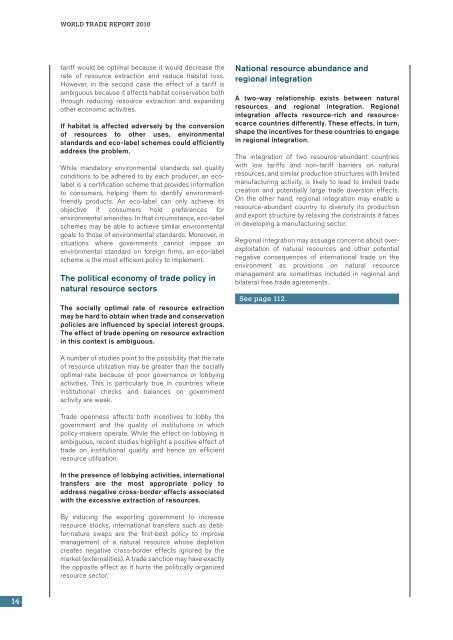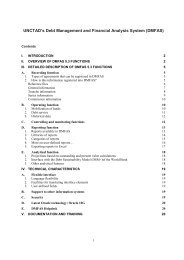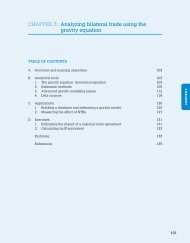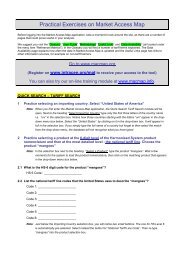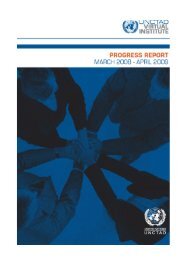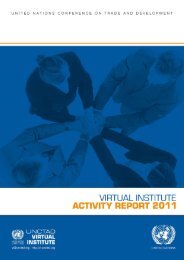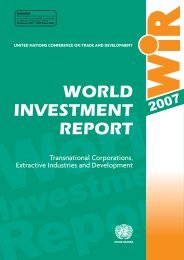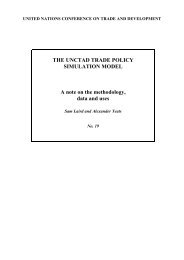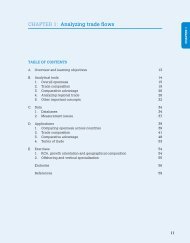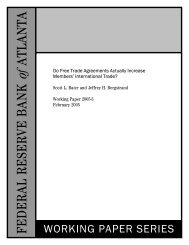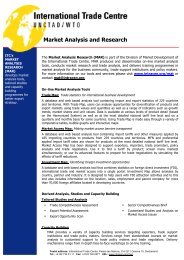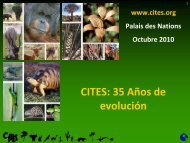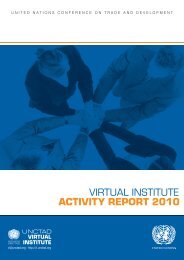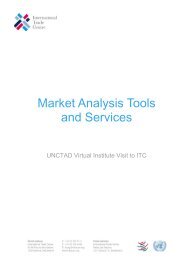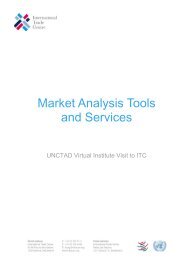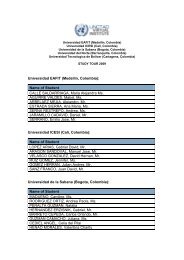WTO: World Trade Report 2010 - World Trade Organization
WTO: World Trade Report 2010 - World Trade Organization
WTO: World Trade Report 2010 - World Trade Organization
You also want an ePaper? Increase the reach of your titles
YUMPU automatically turns print PDFs into web optimized ePapers that Google loves.
world trade report <strong>2010</strong><br />
tariff would be optimal because it would decrease the<br />
rate of resource extraction and reduce habitat loss.<br />
However, in the second case the effect of a tariff is<br />
ambiguous because it affects habitat conservation both<br />
through reducing resource extraction and expanding<br />
other economic activities.<br />
If habitat is affected adversely by the conversion<br />
of resources to other uses, environmental<br />
standards and eco-label schemes could efficiently<br />
address the problem.<br />
While mandatory environmental standards set quality<br />
conditions to be adhered to by each producer, an ecolabel<br />
is a certification scheme that provides information<br />
to consumers, helping them to identify environmentfriendly<br />
products. An eco-label can only achieve its<br />
objective if consumers hold preferences for<br />
environmental amenities. In that circumstance, eco-label<br />
schemes may be able to achieve similar environmental<br />
goals to those of environmental standards. Moreover, in<br />
situations where governments cannot impose an<br />
environmental standard on foreign firms, an eco-label<br />
scheme is the most efficient policy to implement.<br />
The political economy of trade policy in<br />
natural resource sectors<br />
The socially optimal rate of resource extraction<br />
may be hard to obtain when trade and conservation<br />
policies are influenced by special interest groups.<br />
The effect of trade opening on resource extraction<br />
in this context is ambiguous.<br />
National resource abundance and<br />
regional integration<br />
A two-way relationship exists between natural<br />
resources and regional integration. Regional<br />
integration affects resource-rich and resourcescarce<br />
countries differently. These effects, in turn,<br />
shape the incentives for these countries to engage<br />
in regional integration.<br />
The integration of two resource-abundant countries<br />
with low tariffs and non-tariff barriers on natural<br />
resources, and similar production structures with limited<br />
manufacturing activity, is likely to lead to limited trade<br />
creation and potentially large trade diversion effects.<br />
On the other hand, regional integration may enable a<br />
resource-abundant country to diversify its production<br />
and export structure by relaxing the constraints it faces<br />
in developing a manufacturing sector.<br />
Regional integration may assuage concerns about overexploitation<br />
of natural resources and other potential<br />
negative consequences of international trade on the<br />
environment as provisions on natural resource<br />
management are sometimes included in regional and<br />
bilateral free trade agreements.<br />
See page 112.<br />
A number of studies point to the possibility that the rate<br />
of resource utilization may be greater than the socially<br />
optimal rate because of poor governance or lobbying<br />
activities. This is particularly true in countries where<br />
institutional checks and balances on government<br />
activity are weak.<br />
<strong>Trade</strong> openness affects both incentives to lobby the<br />
government and the quality of institutions in which<br />
policy-makers operate. While the effect on lobbying is<br />
ambiguous, recent studies highlight a positive effect of<br />
trade on institutional quality and hence on efficient<br />
resource utilization.<br />
In the presence of lobbying activities, international<br />
transfers are the most appropriate policy to<br />
address negative cross-border effects associated<br />
with the excessive extraction of resources.<br />
By inducing the exporting government to increase<br />
resource stocks, international transfers such as debtfor-nature<br />
swaps are the first-best policy to improve<br />
management of a natural resource whose depletion<br />
creates negative cross-border effects ignored by the<br />
market (externalities). A trade sanction may have exactly<br />
the opposite effect as it hurts the politically organized<br />
resource sector.<br />
14


